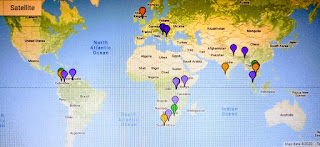Wasswa Chris; Health Navigator of The Year 2020
Health
Navigator
We
use health Promotion and Navigation skills to promote effective involvement by persons
and communities in self-care and social care skills promotion. We are participatory
prevention practitioners.
Carter
(2018) in “Navigation delivery models and roles of navigators in primary care:
a scoping literature review,” draws our attention to whom a Navigator is. Fragmentation
of the social services systems has led to the need for connectors or advocates.
In our case we use a navigator. There are roles and navigation service delivery
models in grassroots based service deliver, care provision and agency. This in turn
has led to various navigation models and as we continue to serve different
population groups we realise we need a better understanding through a
description of the roles of navigators and models of navigation at various
levels including grassroots.
We
asked Wasswa Chris, a Social Justice Health Promotion Activist for five years;
an End to TB/HIV/Malaria integrating COVID-19 Prevention Promoter and Champion;
and Elimination of Violence Campaigner to tell us at least three points about
Health Navigation.
Chris
answered, “know your community, know your numbers, know your needs, know who,
know what, know where, know why, know which, then you will know how to link
issues to solutions.”
Health
navigators are vital links and behaviour change or adapter-reinforcers/catalysts.
According
to the Colorado Department of Public health and environment, A
health navigator (also known as a patient navigator or resource navigator) is a
member of the health care team who helps individuals overcome barriers to
quality care. They address barriers including access to health care, insurance
or lack thereof, poor health literacy, transportation, child care and more.
Health
navigators usually are trusted members of the community they serve and
have an unusually close understanding of the community served, often due to
shared lived experiences.
Health
navigators build effective working relationships with their patients, helping
to support, educate and assist patients to navigate the complex health
care system. To navigate this system, health navigators need to work
effectively with both patients and multidisciplinary care providers and
community partners. They need to be able to identify their patient’s physical,
emotional, and cultural needs and help them access appropriate resources
to meet these needs.
Health
navigators have a good understanding of the health resources available in their
communities in order to refer their patients to the best resources available to
them.
Research
indicates that patient navigation provided by unlicensed health navigators
reduces health disparities, improves patient engagement with their health,
enables patients to get the care they need, improves health outcomes and
reduces health care costs.
Benefits
Health Navigators:
To
increase critical mass of persons strategically and deliberately participating
in self-care
To
increase reliance on qualified medical care
To
increase critical mass of persons engaging in life promoting practices
To
decrease readmission rates among patients due to diabetes, heart failure (HF), pneumonia
(PN) and home related accidents.
Importance:
They
enable one explore service delivery systems navigation provided by individuals
or teams is emerging as a strategy to reduce barriers to care.
They
link beneficiaries to /or with health and social support needs in primary care and
social services experience
They
are aware of what prevails and with their knowledge market-linkages, attach beneficiaries
at right service. They are aware of points of access and gaps in service
delivery; are aware of the great diversity in the design of navigation which
they use to make it easier for beneficiaries to access right services.
Navigators
assist with fragmentation of the health and social health care system through
various methods including: communication with multiple agencies, facilitating
access to care, navigating the system and services or assisting individuals
with health insurance.
There
are other different titles or terms for individuals providing navigation
support, including: Community Health Worker; Community Health Liaison; Community
Health Advisor; Patient Navigator; Navigator; Case Manager; Promotoras; Guided
Care Nurse; Healthy Families Advocate; Lay Health Advocate; Healthy Living
Coach; Visiting Mom; Program Coordinator; and Specialist Nurse.
There
are different navigation models and frameworks. In 33 papers, a navigation
model or framework can be defined based on the location, purpose, model
components, and reported or perceived outcomes of the navigation program.
Reported or perceived outcomes have been categorized as patient outcomes (PO),
provider or navigator outcomes (PNO) and health system outcomes (HSO).
Navigation
is both an art and science we have relied upon to link needs to service
provision and we hope that in providing this article we have shown you how it
works to our advantage. In Wasswa Chris is the epitome of a dedicated,
committed and focused health navigator to whom we dedicate this article.







Comments
Post a Comment